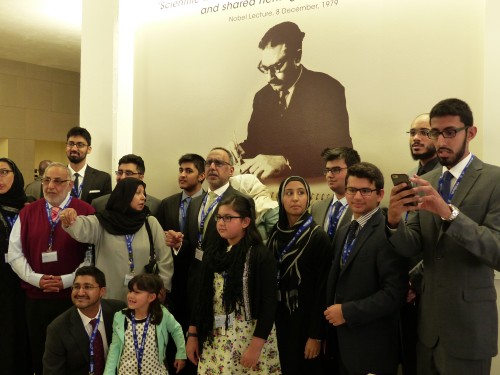
Honouring his achievements – members of Abdus Salam’s family at the International Centre for Theoretical Physics in Trieste.
Matin Durrani in Trieste, Italy
It’s now my third day here at the International Centre for Theoretical Physics (ICTP) in Trieste, which is celebrating its 50th anniversary in grand style. Two days ago we had a marvellous seven-course dinner at Duino Castle, including a hugely spectacular fruit-laden golden-jubilee cake, while yesterday there was a possibly even more sumptuous eight-course dinner hosted by the city that has been home to the centre for half a century.
But pervading all the events has been Abdus Salam, the Pakistani Nobel-prize-winning theoretical physicist who set up the centre in 1964. We know pretty much what Salam did from a scientific point of view, which was celebrated in his 1979 Nobel prize for unifying the weak and electromagnetic forces, but what exactly was he like as a person?
One session at the conference was devoted to this question, where numerous physicists and members of his family tried to put into words Salam’s character. Like all those who have set out in life to achieve something great, in Salam’s case managing against all the odds to set up a centre to help upcoming scientists from developing nations, it proved hard to crystallize his personality into a few words.
Many speakers mentioned Salam seeing science as a birthright, a common culture that should be open to everyone wherever they are in the world. Salam was said to have a concern for education, development and science that continued till his final days, when he suffered from the terrible effects of motor-neurone disease.
Martin Rees, the UK’s Astronomer Royal, called him “a great human being with a great heart” and said he felt that Salam should have won the Nobel Peace Prize for his efforts in setting up the ICTP.
Federico Mayor, a former UNESCO director-general, said via a video message that Salam was “one of the most outstanding human beings and scientists” that he had ever met.
Also in a video recording, Steven Weinberg, who shared the 1979 Nobel prize with Salam and Sheldon Glashow, said that Salam was “missed by many people not least myself”.
Adnan Badran, president of Petra University and a former prime minister of Jordan, called Salam “an outstanding scientist who could move vision and ideas into practice” and who was “a master in the art of persuasion”.
Meanwhile, Robert Delbourgo from the University of Tasmania, who worked at the ICTP in its early days 50 years ago, praised Salam for his heroic efforts in founding the centre. “Without his singlemindedness, you would not be here,” Delbourgo told delegates, adding that he had been “bowled over” by Salam’s enthusiasm and marvelled at his stamina in dealing with politicians while at the same time carrying out front-line research and dealing with the minutiae of academic life.
“With Salam, you either swam or sank, and if you managed to float, you were set up for life,” Delbourgo recalled. “The research pace was feverish because he knew it was important to produce high-quality results that would put the ICTP on the map. It was the most intense period of my life.”
Michael Duff, who holds the Abdus Salam chair in theoretical physics at Imperial College, London, called him “one of the finest physicists of the 20th century, having unified two of the four fundamental forces of nature”. He added, though, that Salam was also “a hard task master”, who “had an element of mysticism about his ideas that left you wondering how to fathom his genius”.
Mohamed Hassan, chairman of the United Nations University, called Salam “one of the world’s most brilliant physicists”, while Tom Kibble of Imperial College, London, praised Salam for his persuasive powers: “He was a very skilled natural diplomat.”
But it was Salam’s children who really brought home their father’s efforts, recalling the price they personally had to pay as Salam was away from their London home for lengthy periods while getting the ICTP off the ground. It was an effort that required huge sacrifices of time and energy in persuading politicians, raising money, chivvying sceptics, forging links, attracting scientists, encouraging people, initiating research and not least getting a building constructed and running.
Almost 20 years after his death, it is clear that had it not been for Salam’s single-mindedness and determination, the ICTP would never have become what it is today.
The thing that marked me most during the little personal contacts that I had with Salam over the years and at different places, was his childlike naiveness that suffered no hesitation and obstacles in his going forwards and actions.
Mr. Asghar I have never heard this great analysis of Dr. Salam personality. I agree with you!
No worldly charm or fear could change his “beautiful mind” which was open for all good !
In 1984 I was student of MSc.(Physics) at PAU Ludhiana INDIA, sent Profession Abdus Salam a handwritten note of few pages. The theme was Newton’s F =ma must be read as F =m(u+v)S/t
Every professor had refused to look at this. But Professor Salam read it carefully and asked me to clarify the point of view.
He believed , IDEAS ARE RARE , EVEN MAY BE WRONG. Any how I had to abandon that idea, that now I am author of two innovative books BEYOND NEWTON AND ARCHIMEDES and
BEYOND EINSTEIN AND E=mc2
I salute the great soul.
Trackback: Physics Viewpoint | Who was the real Abdus Salam?
Trackback: Blog - physicsworld.com